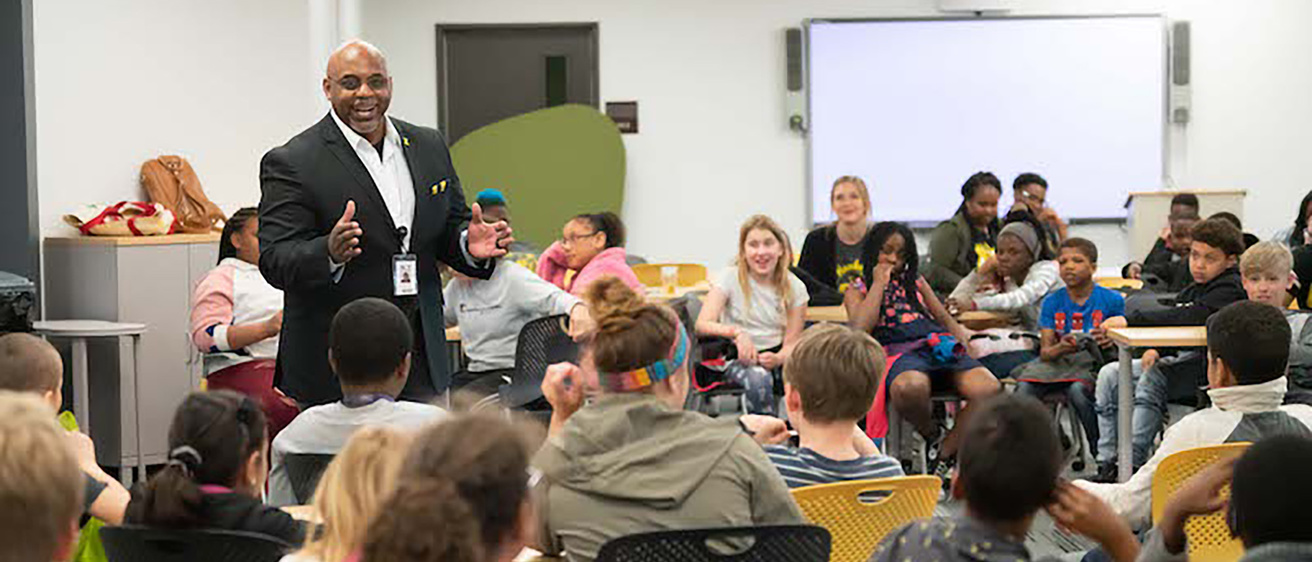By Mei-Ling Shaw
Elizabeth Getachew wants all students to feel inspired and supported in their classrooms.
“This idea of pulling yourself up by your bootstraps, well, some kids don’t have straps,” says Getachew.
That’s why Getachew, a doctoral candidate in Educational Policy and Leadership Studies, is researching educational opportunity gaps for young African-Americans.
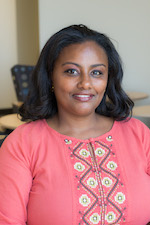
Nineteen University of Iowa students visited Kirkwood Elementary classrooms last spring to mentor and read with the students. Among the volunteers, several pre-service Hawkeye Teachers gained real-life, learning experiences in diverse classroom settings.As part of her work, Getachew organized this year’s AVID (Advancement Via Individual Determination) program at Kirkwood Elementary School in Coralville. AVID, a national program, focuses on providing tools for teachers and exposing students to the higher education environment to help them identify opportunities.
Getachew notes that Kirkwood Elementary School has 75 percent students of color with predominantly white, female teachers.
“Examining this idea about opportunity, it’s like an onion. When you peel it more and more, you realize there is something more profound that is affecting how students perform,”Getachew says. “History is an important component of understanding that.”
Leslie Locke, assistant professor in Educational Policy and Leadership Studies, researches marginalization, equity, and access in K-12 schools and how leadership can improve the school experiences of students from marginalized groups.
“It’s important that teachers and leaders get an understanding,” says Locke, who is also the faculty co-chair of the college’s Diversity Committee. “People have been denied access and opportunity.”
Locke, who develops educator professional development that addresses diversity, notes the college’s dedication as a whole. “We want to improve education, whether that’s K-12 or higher ed, whether it’s teaching practice or leadership practice. We’re all here to move it forward in some way.”
“Teachers and leaders are there to do the good work, to get their kids to whatever level they can and send them on and upward,” says Locke, “but if we don’t have an understanding of our history of inequality, then myths and stereotypes can take over. It’s very easy to fall back on an uninformed ideology for why people do what they do.”
Locke uses a timeline to illustrate this history during her professional development lessons. Starting from 1607 when Jamestown was founded to present day, the length of unequal access becomes clear, Locke says, noting that, “80 percent of the timeline of our nation we have denied some people access and opportunity. Those are facts.”
Locke says this lack of access and opportunity is manifested in many different ways.
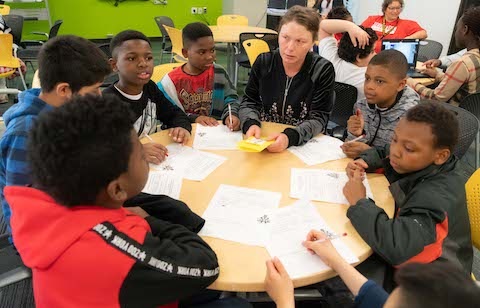
“Those things are very evident today. It’s evident in student outcomes, where people live, health, employment. Those are our roots,” says Locke. “Without that understanding, people may come in with uninformed ideologies about students, families, and communities.”
She adds, “We’re trying to figure out ways the university can connect with folks that are working on the ground in K-12, to use resources and expertise to help improve practice and improve the experiences for kids in schools.”
AVID at Kirkwood Elementary is supported by the College of Education, ACT, and the Iowa City Community School District. “This is a marvelous collaboration of three giants coming together to work for one little child,” Getachew says. “And the impact is phenomenal.”
Fifty-five Kirkwood Elementary School fourth grade students visited campus for tours, small group discussions, and presentations by the Alpha Phi Alpha Fraternity, Associate Dean Nancy Langguth and Lew Montgomery, ACT’s director of Community Partnerships & Strategy in the Center for Equity in Learning.
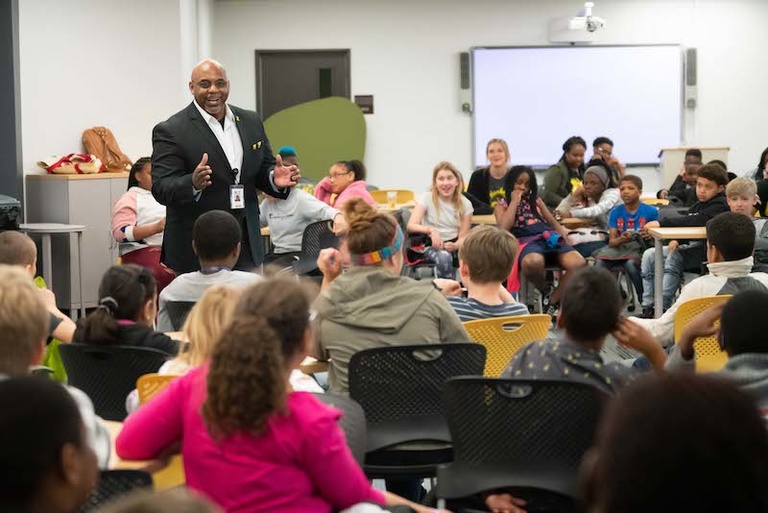
Additionally, teachers, professors, doctors, and lawyers spoke in small groups with the students about their professions and how they found their individual paths.
The success of this year’s program has led to more interest. Two additional elementary schools and all three local high schools are joining the program this year.
“Kids have asked me, ‘Why do you do this?’” says Getachew. Her response? “Because I want to see you grow. The goal is to provide free, public education so that you have a society that can contribute to the greater good of overall society – what it means to be an American.”
Kedibona Ochs (BA ‘19) understands the potential and difficulty of the American promise. Ochs is also a member of one of the most under-represented groups in teaching: African-American males.
Ochs’ family immigrated to Dubuque, Iowa, from Namibia when he was a young boy. When his father was not allowed to return to the U.S. after a visit to Africa, Ochs was left here on his own.
“My parents, my whole family, was back in Africa, and I was forced to grow up way faster than my friends,” recalls Ochs.
When he was 15, Ochs experienced homelessness and extreme financial stress. He worked nights on a paper route before going to school to try to make ends meet.
When he finally confided in one of his teachers about his situation, he was met with a wave of support.
“When I think of the teachers, the whole community around my high school, they showed me, as a kid who was struggling and not wanting to go to school, there is somebody who cares about you,” says Ochs.
He ultimately decided to pursue teaching as a way of paying forward the support and acceptance he received. Ochs began teaching English this year at Liberty High School in North Liberty, Iowa. He hopes his story will inspire and propel his students to become thoughtful, accepting, and curious.
“The beauty in my struggle is that I have experienced so much that a lot of these kids are experiencing,” says Ochs. “It’s nice for them to see somebody who has experienced some of the same stuff. To say ‘Okay, so something does come out of this. There is light at the end of this tunnel because right now it’s just pure darkness, and I’m just trying to get by.’”
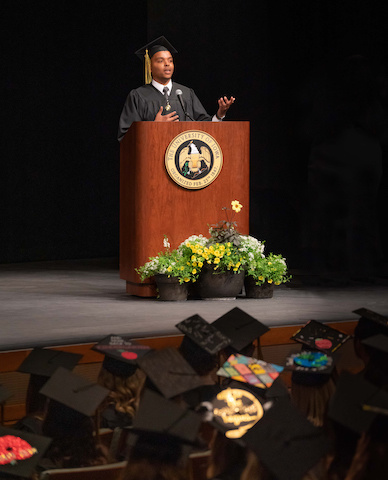
He adds, “You can’t think of a way out when you’re stuck in there, but then when you get out you’re like ‘That actually made be a better person’ and it helped me develop this skill that I can now use to help this other person who is stuck, now I can help pull them out.”
Having inspiring teachers is important for all students, but it is especially impactful to students with marginalized identities to see reflections of their realities. A recent U.S. Department of Education publication, The State of Racial Diversity in the Educator Workforce,notes “Both quantitative and qualitative studies find that teachers of color can improve the school experiences of all students; further, teachers of color contribute to improved academic outcomes while serving as strong role models for students (of color).”**
Growing diversity in the teaching workforce, as highlighted in the college’s strategic plan, is a priority in the Teacher Education Program (TEP). According to a recent U.S. Department of Education Schools and Staffing Survey (SASS)** of teachers and principals across the nation, 82 percent of public-school teachers identified as white, but almost half of students are non-white.
Attracting diverse students interested in the teaching field and retaining them through student to teacher pathways is essential to meet the needs of America’s students and workforce.
The college’s TEP enrollments by students of color have outpaced the national trends, but the college continues to seek new, effective practices to meet the needs of today’s student population.
The college is committed to supporting underrepresented students, including socioeconomic status, disability, gender identity or first-generation status.
With support from Dean Dan Clay, the university-wide 1st generation student initiative, spearheaded by Carolyn Colvin within the college, continued for a second year. The working group includes 25 active members and focuses on supporting undergraduate and graduate First-Generation Students.
“We believe the College of Education can be a campus leader in helping members of the UI community understand how to meet the learning needs of First Gen students,” says Colvin.
The University of Iowa's First Gen Task Force was recognized for its support with admission to the 2019-20 inaugural First Forward cohort sponsored by the Center for First-Generation Student Success, an initiative of NASPA and the Suder Foundation.
Work conducted throughout the college continues to address the spectrum of diversity issues in the country.
“As a college, we have made the commitment to increasing diversity and working to meet the needs of our society,” says Clay. “We recognize the intention and dedication it will take, and we are moving it forward every day.”
Read more from the 2018-2019 Annual Report.
